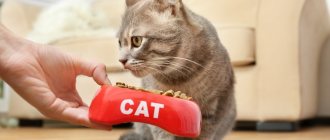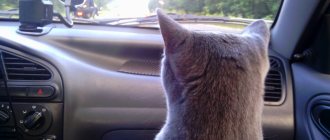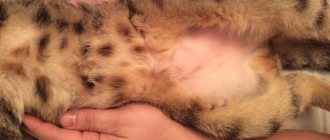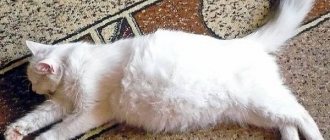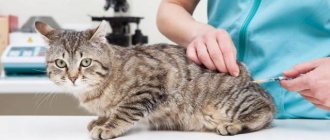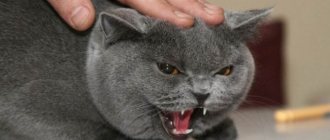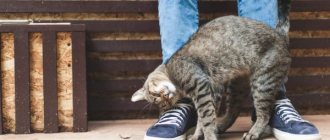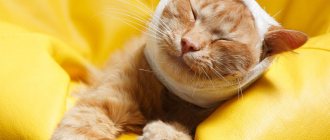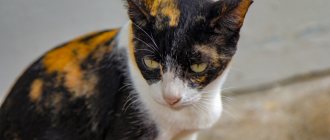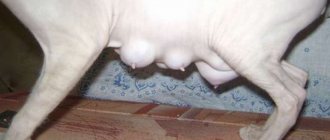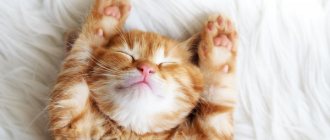Reasons why a cat's tummy is swollen
Bloat can happen for many reasons, and some of them can be life-threatening for your pet.
Poor nutrition and gases
A kitten's belly may become bloated due to certain foods. Often, flatulence (accumulation of gases in the intestines) results from feeding your pet milk and dairy products (especially for adult animals).
The cause of bloating may be the high content of carbohydrates in the menu: wheat, corn, etc.
Constipation
Constipation is an accumulation of stool that becomes dry and hard and cannot be passed out on its own. This leads to intoxication of the body, and gases begin to accumulate in the intestines, which cause bloating.
Constipation occurs for many reasons:
- incorrectly composed diet;
- intestinal obstruction;
- accumulation of wool in the stomach;
- congenital anomalies;
- obesity and inactivity.
Constipation may cause bloating in cats
Swollen intestines from worms
Severe infestation of a cat with worms is another cause of flatulence or bloating.
Parasites actively multiply in the pet’s intestines and cause intoxication. Along with bloating, the cat also experiences other symptoms: vomiting, bowel irregularities, and the presence of worms in the feces. Moreover, the cat may be thin, but with a bloated intestine.
The animal eats a lot
Cats that eat very greedily and eat a lot often suffer from flatulence. At the same time, they swallow food without chewing it, which leads to large amounts of air entering the intestines and stomach. As a result, the intestines can swell to incredible sizes. Usually the animals themselves who live in shelters or nurseries eat so greedily.
Overeating leads to bloating in animals
Diseases of internal organs
Enlarged intestines can be a symptom of serious diseases of the internal organs:
- Pyometra. With this disease, pus accumulates in the cat's uterus, which is accompanied by an enlargement of the abdominal cavity. Associated symptoms: depression, fever (not always present), discharge from the loop.
- Peritonitis. An enlarged abdomen or ascites (accumulation of fluid in the abdominal cavity) accompanies the wet form of coronavirus infection (FIP).
- Tumors. The volume of the abdomen may increase significantly due to a malignant tumor in the abdominal cavity.
Bloating can occur with intestinal obstruction. This condition is life-threatening and requires immediate surgical intervention.
Some diseases can cause bloating
Symptoms
If the cat is in an acute condition, then all the symptoms will be pronounced, and it is impossible not to notice them. But often, the animal experiences only a slight malaise, and the fact that the cat has a stomach ache becomes clear only after a certain time, when the animal loses weight and stops cuddling and playing. That is why even the slightest deviation from the norm of a pet’s behavior should be alarming.
Signs of abdominal pain and digestive disorders include:
- The cat is hunched over, or cannot lie still, avoiding pressure on the stomach.
- The animal moves less, does not play, and sits in one place.
- Elevated temperature - more than 39°, in kittens - more than 39.5°.
- When you try to stroke the cat's belly, he resists.
- On palpation, bloating is felt, the cat’s stomach is dense and seething.
- The cat eats less or refuses to eat at all, which indicates a serious condition.
- Loose stools, diarrhea, may be mixed with blood, stools with mucus.
- Vomiting can also be with blood.
- When your cat goes to the toilet, he may moan or make sounds that indicate painful bowel movements or urination.
- The cat is losing weight.
- The wool looks worse and loses its shine.
- In case of serious poisoning, convulsions and foam at the mouth are observed.
- Symptoms of gastritis: the cat does not eat or eats little, does not move, often vomits, there is a bad smell coming from the mouth, diarrhea, a swollen and rumbling stomach.
- Symptoms of enteritis: diarrhea, stool with particles of undigested food, mucus or blood, apathy, painful abdomen, bloating, loss of appetite, poor coat, painful bowel movements.
- Symptoms of poisoning: refusal to eat and drink, foam coming from the mouth, convulsions, the animal moves little.
- Symptoms of panleukopenia: vomiting, sometimes with blood, diarrhea, lacrimation, fever up to 41°, due to abdominal pain, the cat sits hunched over or lies on its side, often sits next to a container of water, but does not drink; the animal suddenly loses weight.
- Symptoms of helminthic infestation: painful stomach, loss of appetite, thirst, the cat is less active, stool with mucus, sometimes also with blood, vomiting, sometimes vomiting with worms, constipation followed by diarrhea, hair loss, weight loss.
- Symptoms of pancreatitis: lethargy, fever, severe vomiting and diarrhea, lack of stool during vomiting, dehydration, difficulty breathing, very painful stomach.
- Symptoms of food allergies: itchy skin, skin rashes, nasal congestion and discharge, vomiting and diarrhea.
All of the above diseases are accompanied by abdominal pain of varying degrees of intensity, and this is an incomplete list. Many diseases have similar symptoms, in addition to abdominal pain, and their diagnosis should only be carried out by a specialist.
How to eliminate bloating in cats and kittens
Now let's talk about what to do to eliminate a bloated belly in your pet. The method of eliminating bloating depends on the root cause of this condition:
- If flatulence was caused by poor nutrition, it is necessary to exclude all gas-forming products (primarily milk) from the pet’s diet. You can also give your pet Espumisan, Lactobacterin or Acipol.
- In case of constipation, it is necessary to exclude obstruction. If it is not there, the pet is first given Vaseline oil, and if it does not give an effect, then you can use laxatives (Lactusan, Duphalac, etc.).
- If the bloating was caused by helminths, you should give your pet a drug against these parasites. The following drugs are most effective: Milbemax, Kanikvantel, Prazitel, Drontal. In case of severe infestation, the medicine is given twice, with a break of 10 days.
- If the bloating was caused by overeating or the cat greedily swallowing air while eating, you can first fill the dry food with warm water. It is also recommended to provide your pet with constant access to food (in this case, a strictly daily amount is poured into the bowl per day).
In the event that an enlarged abdomen is the result of diseases of the internal organs, it is necessary to show the pet to a veterinarian.
Treatment of a cat should depend on the diagnosis
What to do to eliminate the pathology?
If the kitten's sides are swollen due to a severe internal illness, the doctor will hospitalize the pet and, if necessary, perform surgery. In other cases, you can deal with the problem at home. For constipation, you can give your pet the drug Duphalac and use microenemas. Vaseline oil will help improve digestion; its dosage is 0.1 ml per 100 g of weight. It is recommended to give the product 2-3 times a day.
If the cat's swollen sides are a sign of helminthic infestation, in this situation antihelminthics will help normalize the condition.
Doctors at the Zoovet clinic point out that not every drug is intended for kittens aged 2-3 months. Therefore, the veterinarian should select the medicine, taking into account the baby’s age, the degree of invasion and other individual characteristics.
After giving birth, the cat's abdomen will return to its normal position without special treatment. The problem of overeating is easy to eliminate. Often, increased appetite is associated with a lack of vitamins and other elements in the body. Therefore, it is better to feed your cat with ready-made food, where all the ingredients are balanced and selected for a certain age.
When should you contact a veterinarian to treat your cat?
If your pet exhibits symptoms such as vomiting, pain, and drooling along with a bloated belly, you should consult a veterinarian.
The doctor will prescribe the necessary tests and examinations (blood tests, ultrasound, x-rays, etc.), after which he will prescribe the appropriate treatment:
- A pathological condition such as pyometra requires immediate surgical intervention. During the operation, the doctor carefully removes the uterus along with the pus that has accumulated in it.
- If the abdomen has become enlarged due to infectious peritonitis, the doctor will prescribe supportive treatment: antibiotics and corticosteroids. Also, with the wet form of FIP, the fluid that accumulates in the abdomen is periodically pumped out.
- If a cat has an obstruction, the doctor will prescribe an immediate operation, during which the root cause of this condition (foreign body, tumor, etc.) will be eliminated.
Bloating does not always indicate a serious pathology.
In most cases, flatulence is the result of an incorrectly composed diet. The accumulation of gases in the intestines causes discomfort to the pet, so it is necessary to provide assistance to the animal as quickly as possible.
Changes in muscle tone during pregnancy
In most cases, pregnancy in cats is easy. The cat does not feel any discomfort, but is reluctant to be handled and strains its abdominal muscles when trying to feel it. A very hard belly in a cat may indicate a pathologically developing pregnancy. This condition ends in miscarriage and is accompanied by changes in the pet’s behavior - she refuses to eat, drinks a lot, behaves restlessly and constantly meows. In the early stages, detecting a miscarriage in a cat is problematic, while pregnancy failure in the later stages is accompanied by heavy bleeding.
If your cat has a hard belly after giving birth, you should take the animal to the vet as soon as possible. This is a dangerous sign indicating the development of pyometra. This disease is caused by the penetration of pathogenic bacteria into the uterine cavity. Pyometra is accompanied by profuse suppuration, which can be caused by infection of the uterus during delivery.
Symptoms of a dangerous disease:
- Hard and swollen abdomen.
- Refusal of food.
- Increased thirst.
- Increased body temperature.
- General deterioration in health.
With pyometra, veterinarians insist on surgical removal of the uterus and appendages. A timely detected disease can be successfully treated with antibiotics, but only at the beginning of the development of the pathological process.
